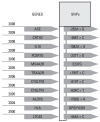Update on recent advances in the management of aspirin exacerbated respiratory disease
- PMID: 20046412
- PMCID: PMC2796398
- DOI: 10.3349/ymj.2009.50.6.744
Update on recent advances in the management of aspirin exacerbated respiratory disease
Abstract
Aspirin intolerant asthma (AIA) is frequently characterized as an aspirin (ASA)-exacerbated respiratory disease (AERD). It is a clinical syndrome associated with chronic severe inflammation in the upper and lower airways resulting in chronic rhinitis, sinusitis, recurrent polyposis, and asthma. AERD generally develops secondary to abnormalities in inflammatory mediators and arachidonic acid biosynthesis expression. Upper and lower airway eosinophil infiltration is a key feature of AERD; however, the exact mechanisms of such chronic eosinophilic inflammation are not fully understood. Cysteinyl leukotriene over-production may be a key factor in the induction of eosinophilic activation. Genetic studies have suggested a role for variability of genes in disease susceptibility and response to medication. Potential genetic biomarkers contributing to the AERD phenotype include HLA-DPB1*301, LTC4S, ALOX5, CYSLT, PGE2, TBXA2R, TBX21, MS4A2, IL10 -1082A > G, ACE -262A > T, and CRTH2 -466T > C; the four-locus SNP set was composed of B2ADR 46A > G, CCR3 -520T > G, CysLTR1 -634C > T, and FCER1B -109T > C. Management of AERD is an important issue. Aspirin ingestion may result in significant morbidity and mortality, and patients must be advised regarding aspirin risk. Leukotriene receptor antagonists (LTRA) that inhibit leukotriene pathways have an established role in long-term AERD management and rhinosinusitis. Aspirin desensitization may be required for the relief of upper and lower airway symptoms in AERD patients. Future research should focus on identification of biomarkers for a comprehensive diagnostic approach.
Keywords: Aspirin; asthma; eosinophil; genetic polymorphism; leukotriene.
Conflict of interest statement
The authors have no financial conflicts of interest.
Figures


Similar articles
-
Genetic mechanisms in aspirin-exacerbated respiratory disease.J Allergy (Cairo). 2012;2012:794890. doi: 10.1155/2012/794890. Epub 2011 Aug 7. J Allergy (Cairo). 2012. PMID: 21837245 Free PMC article.
-
Genetic variability in CRTH2 polymorphism increases eotaxin-2 levels in patients with aspirin exacerbated respiratory disease.Allergy. 2010 Mar;65(3):338-46. doi: 10.1111/j.1398-9995.2009.02158.x. Epub 2009 Oct 1. Allergy. 2010. PMID: 19796209
-
Prominent role of IFN-γ in patients with aspirin-exacerbated respiratory disease.J Allergy Clin Immunol. 2013 Oct;132(4):856-65.e1-3. doi: 10.1016/j.jaci.2013.05.008. Epub 2013 Jun 24. J Allergy Clin Immunol. 2013. PMID: 23806637 Free PMC article.
-
An update on the pathogenesis of the upper airways in aspirin-exacerbated respiratory disease.Curr Opin Allergy Clin Immunol. 2014 Feb;14(1):1-6. doi: 10.1097/ACI.0000000000000021. Curr Opin Allergy Clin Immunol. 2014. PMID: 24300420 Review.
-
Aspirin or other nonsteroidal inflammatory agent exacerbated asthma.J Allergy Clin Immunol Pract. 2014 Nov-Dec;2(6):653-7. doi: 10.1016/j.jaip.2014.09.009. Epub 2014 Nov 6. J Allergy Clin Immunol Pract. 2014. PMID: 25439353 Review.
Cited by
-
Aspirin sensitivity and chronic rhinosinusitis with polyps: a fatal combination.J Allergy (Cairo). 2012;2012:817910. doi: 10.1155/2012/817910. Epub 2012 Aug 14. J Allergy (Cairo). 2012. PMID: 22927869 Free PMC article.
-
Genetic mechanisms in aspirin-exacerbated respiratory disease.J Allergy (Cairo). 2012;2012:794890. doi: 10.1155/2012/794890. Epub 2011 Aug 7. J Allergy (Cairo). 2012. PMID: 21837245 Free PMC article.
-
Major comorbid conditions in asthma and association with asthma-related hospitalizations and emergency department admissions in adults: results from the German National Health Telephone Interview Survey (GEDA) 2010.BMC Pulm Med. 2013 Jul 12;13:46. doi: 10.1186/1471-2466-13-46. BMC Pulm Med. 2013. PMID: 23849455 Free PMC article.
-
Epidemiology and differential diagnosis of nasal polyps.Am J Rhinol Allergy. 2013 Nov-Dec;27(6):473-8. doi: 10.2500/ajra.2013.27.3981. Am J Rhinol Allergy. 2013. PMID: 24274222 Free PMC article. Review.
-
Symptom-Based Clustering in Chronic Rhinosinusitis Relates to History of Aspirin Sensitivity and Postsurgical Outcomes.J Allergy Clin Immunol Pract. 2015 Nov-Dec;3(6):934-40.e3. doi: 10.1016/j.jaip.2015.06.018. Epub 2015 Jul 26. J Allergy Clin Immunol Pract. 2015. PMID: 26216252 Free PMC article.
References
-
- Yoshida S, Ishizaki Y, Onuma K, Shoji T, Nakagawa H, Amayasu H. Selective cyclo-oxygenase 2 inhibitor in patients with aspirin-induced asthma. J Allergy Clin Immunol. 2000;106:1201–1202. - PubMed
-
- Szczeklik A, Nizankowska E, Duplaga M. Natural history of aspirin-induced asthma. AIANE investigators. European Network on Aspirin-Induced Asthma. Eur Respir J. 2000;16:432–436. - PubMed
-
- Hedman J, Kaprio J, Poussa T, Nieminen MM. Prevalence of asthma, aspirin intolerance, nasal polyposis and chronic obstructive pulmonary disease in a population-based study. Int J Epidemiol. 1999;28:717–722. - PubMed
-
- Mascia K, Haselkorn T, Deniz YM, Miller DP, Bleecker ER, Borish L TENOR Study Group. Aspirin sensitivity and severity of asthma: evidence for irreversible airway obstruction in patients with severe or difficult-to-treat asthma. J Allergy Clin Immunol. 2005;116:970–975. - PubMed
Publication types
MeSH terms
Substances
LinkOut - more resources
Full Text Sources
Other Literature Sources
Research Materials
Miscellaneous

